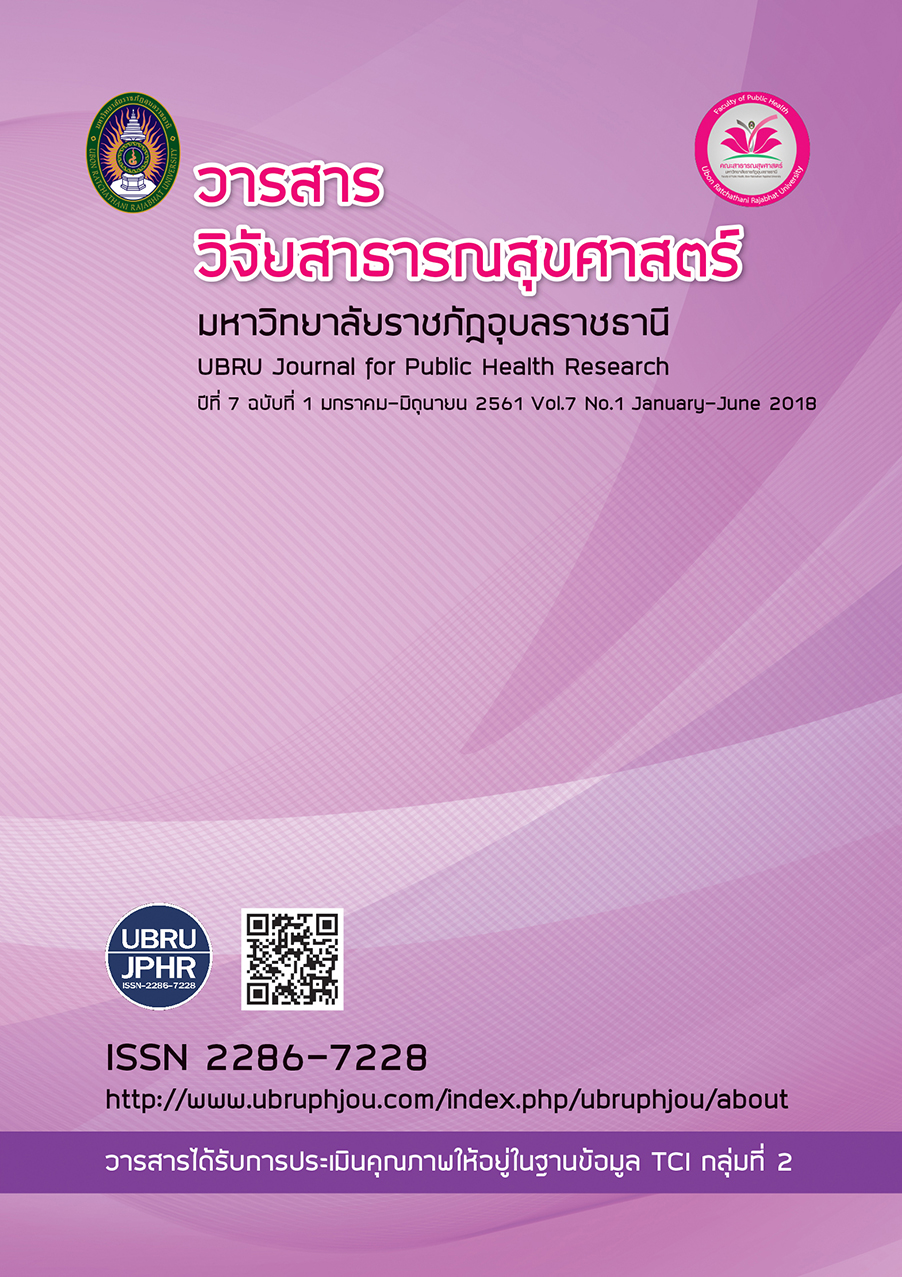Effects of laughter yoga exercises to reduce stress of the second year nursing student of Ubon Ratchathani Rajabhat University
Keywords:
Laughter yoga exercises program, stress, nursing studentAbstract
The aim of this research was to 1) compare stress of experimental group before and after entering laughter yoga exercises program 2) compare stress of experimental and control group after entering laughter yoga exercises program and 3) examine satisfaction on laughter yoga exercises program. A sample of sophomore year nursing students was recruited and was selected by simple random sampling, 30 from Faculty of Nursing at Ubon Ratchathani Rajabhat University were in the experimental group and 30 from Faculty of Nursing at Ratchathani University were in the control group. Research instruments consisted of (1) instruments for collecting data: demographic data, the Suan Prung Stress test and the satisfaction test, (2) instrument for conducting research: the laughter yoga exercises program. Data were analyzed using descriptive statistics, and t-test. The results of this study demonstrated that stress of experimental group was significantly different before and after receiving the laughter yoga exercises program (p<.05). When comparison between experimental and control group, stress did not differ statistically significant at the 0.05 level. Finally, overall satisfaction to the program was at the high level. The results of this study indicated that even though comparison between experimental and control group in stress did not differ, stress score among nursing students tended to decrease after entering the program.
References
กัญญ์สิริ จันทร์เจริญ และสุกันยา นัครามนตรี. (2559). ความสัมพันธ์ระหว่างการสนับสนุนทางสังคมกับทักษะชีวิตของนักศึกษาหลักสูตรพยาบาล ศาสตรบัณฑิต. วารสารเครือข่ายวิทยาลัยพยาบาลและการสาธารณสุขภาคใต้. 3(2): 85-99.
เกียรติศักดิ์ อองกุลนะ. (2551). ผลของการใช้โปรแกรมการจัดการความเครียดโดยการคิดแบบอริยสัจสี่และการบริหารร่างกายแบบโยคะ ต่อพฤติกรรมการจัดการความเครียดและระดับความเครียดของนักศึกษาพยาบาล. วิทยานิพนธ์พยาบาลศาสตรมหาบัณฑิต มหาวิทยาลัยนเรศวร.
มณฑา ลิ้มทองกุล และสุภาพ อารีเอื้อ. (2552). แหล่งความเครียดวิธีการเผชิญความเครียดและผลลัพธ์การเผชิญความเครียด ของนักศึกษาพยาบาลในการฝึกภาคปฏิบัติครั้งแรก. รามาธิบดีพยาบาลสาร. 12(1): 1-8.
สุวัฒน์ มหัตนิรันดร์กุล และคณะ. (2545). แบบวัดความเครียด. เชียงใหม่: โรงพยาบาลสวนปรุง กรมสุขภาพจิต กระทรวงสาธารณสุข,.
อาภรณ์ ภู่พัทธยากร. (2554). ผลของการฝึกโยคะพื้นฐานต่อสมรรถภาพทางกายและความเครียดของนักศึกษาพยาบาล วิทยาลัยพยาบาล บรมราชชนนี ตรัง. ตรัง: วิทยาลัยพยาบาลบรมราชชนนีตรัง.
Farifteh, S., Mohammadi-Aria, A., Kiamanesh, A., & Mofid, B. (2004). The impact of laughter yoga on the stress of cancer patients before chemotherapy. Iranian Journal of Cancer Prevention. 4: 179-83.
Lazarus, R.S., & Folkman, S. (1984). Stress, Appraisal and Coping. New York: Springe Publishing.
Madan K. (2002). Laugh for no reason. 2nded. Mumbai: International.
Madan K. (1995). The Best Medicine,' from Reader's Digest. (online) (อ้างเมื่อ 9 มกราคม 2560) จาก http://myhero.com/hero.asp?hero=kataria, 1995.
Masoudi Alavi N. (2014). Self-efficacy in nursing students. Nursing and Midwifery Studies. 3(4): e25881.
Norman, G. R. & Streiner, D. L. (2002). Biostatistics: The bare essential. 2nd ed. Hamilton: B.C. Decker.
Sharif, F., & Masoumi S. (2005). A qualitative study of nursing student experiences of clinical practice. BioMed Central Nursing. 4(6): 1-7.
Texier L, Jessica A. (2017). The use of laughter yoga to decrease stress and improve coping nursing students. [internet]. [cited 2017 Jan 19]: Available from: https://www.nursinglibrary.org/vhl/bitstream/10755/338634/2/JLeTexier_DNP8020_La ughter+Yoga+Manuscript.pdf
Woodbury-Fariña, M. A., & Schwabe, M. M. (2015). Laughter yoga: benefits of mixing laughter and yoga. Journal of Yoga & Physical Therapy. 5: 4-5.
Yazdani M, Rezaei S, Pahlavanzadeh S. (2014). The effect of laughter Yoga on general health among nursing students. Iranian Journal of Nursing and Midwifery Research. 19(1): 36–40.
Downloads
Published
How to Cite
Issue
Section
License
เนื้อหาและข้อมูลในบทความที่ลงตีพิมพ์ในวารสารวารสารวิจัยสาธารณสุขศาสตร์ มหาวิทยาลัยราชภัฏอุบลราชธานี ถือเป็นข้อคิดเห็นและความรับผิดชอบของผู้เขียนบทความโดยตรงซึ่งกองบรรณาธิการวารสาร ไม่จำเป็นต้องเห็นด้วย หรือร่วมรับผิดชอบใดๆ
บทความ ข้อมูล เนื้อหา รูปภาพ ฯลฯ ที่ได้รับการตีพิมพ์ในวารสารนี้ ถือเป็นลิขสิทธิ์ของวารสารฯ หากบุคคลหรือหน่วยงานใดต้องการนำทั้งหมดหรือส่วนหนึ่งส่วนใดไปเผยแพร่ต่อหรือเพื่อกระทำการใดๆ จะต้องได้รับอนุญาตเป็นลายลักอักษรณ์จากบรรณาธิการวารสารนี้ก่อนเท่านั้น


